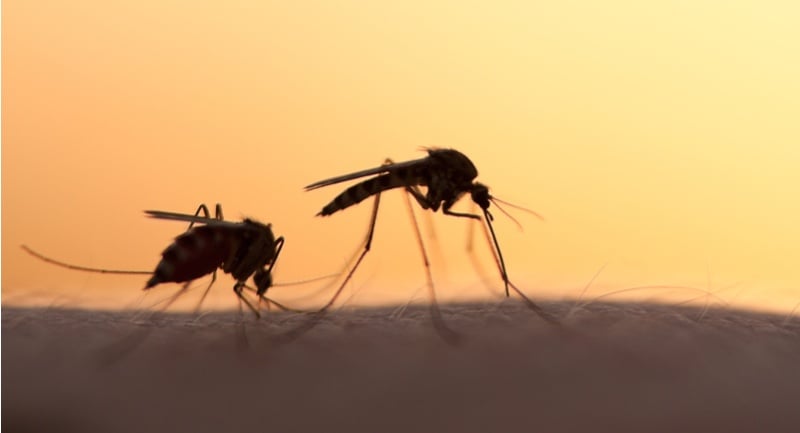This article was originally published in November 2020 and has since been updated with the latest in biotechs fighting mosquito-borne diseases.
Genetic engineering is breaking new ground in the control of mosquito-borne diseases. However, a genetic engineering approach isn’t the only option, as many biotech companies aim to prove.
As the global climate continues to warm, disease-spreading mosquitoes such as Aedes aegypti are expected to establish themselves in the U.S. and Europe. This could result in explosive outbreaks of debilitating mosquito-borne infections such as dengue fever, Zika and chikungunya. At the same time, some of the most effective control methods, chemical insecticides, are starting to lose the fight against insecticide resistance.
The U.K. company Oxitec, owned by the U.S. firm Third Security, is making big headlines lately for its efforts to prevent mosquito-borne infections. Earlier this year, the company launched the next phase of U.S. pilot studies studying the effectiveness of its A. aegypti mosquito strain that is designed to reduce wild populations.
Oxitec does this by releasing genetically altered males into the affected area, which mate with wild females to produce offspring. If the offspring is male, it survives to mate again. But if the offspring is female, it dies straight away, reducing the wild population while also limiting the spread of the death-causing gene.
This is just part of Oxitec’s strategy though. Of the surviving male offspring, one half carries the lethal gene, while the other half carries genes that make the insects vulnerable to insecticides. So not only can the wild mosquito population contract, but it could also become less resistant to common chemical control methods.
“This is the first insect-based solution built specifically to provide targeted mosquito suppression with simplicity, scalability and economic sustainability, further unlocking the benefits of biological public health solutions for governments, communities and other end-users,” said Nathan Rose, head of regulatory affairs at Oxitec.
According to one trial in Brazil, these mosquitoes delivered in egg form cut local mosquito populations by 95%, so they could go a long way in tackling the problem of dengue and other diseases. But one of the snags of this technology is that it relies on using genetically modified organisms (GMOs).
In Europe, the use of GMOs is strictly controlled, so companies using this approach would have a hard time complying with the regulations. In regions more open to GMOs such as the U.S., there are still vocal opponents. Oxitec has often worked amid negative publicity from activists, with occasional comparisons made between Oxitec’s project and the classic science fiction movie Jurassic Park.
To get around this drawback, many organizations and companies aim to control mosquito-borne diseases without the use of genetic engineering.
Keeping the insects, losing the diseases
One key example of a non-GMO approach in controlling mosquito-borne diseases is the global non-profit World Mosquito Program. The program produces and releases into the wild a strain of Aedes mosquito that is infected with a bacterial genus called Wolbachia. Mosquitoes infected with these bacteria — which are harmless to humans — don’t die; the insects simply transmit fewer common mosquito-borne infections such as dengue.
Recently, this Wolbachia approach seems to have made a major breakthrough. In 2021, researchers revealed that the approach had sliced dengue transmission by 77% in regions of the city Yogyakarta in Indonesia.

“This is a conservative estimate as the reduction would likely have been greater if the whole city had received the intervention,” said Nicholas Jewell, a biostatistician at the University of California, U.S., who carried out the statistics of the study. “The result is extremely promising for reducing or eliminating dengue across the world.”
A bonus of this approach is that Wolbachia are transmitted from mother mosquitoes to their offspring, and it could remain in the mosquito populations for at least a decade. In contrast, common insecticides usually need reapplication at least once a year.
Though promising, a drawback of this approach is that the researchers have to inject the bacteria into mosquito eggs, a process that isn’t easy to scale. To help with this, the initiative aims to bring in assistance from the private sector.
“Scaling up production of enough mosquitoes to meet demand is our biggest challenge,” said Dale Amtsberg, senior media & PR advisor at the World Mosquito Program. “We have partnered with French insect production startup InnovaFeed to help take our mosquito production to an industrial scale.”
Releasing sterile males without genetic modifications
Our neighborhood hero Wolbachia has other applications besides simply reducing the transmission of mosquito-borne diseases. The U.S. company MosquitoMate specializes in using the bacteria as an effective insecticide.
To do this, MosquitoMate releases Wolbachia-infested male Aedes mosquitoes into the target region. Here, they mate with wild females, which don’t naturally carry Wolbachia bacteria and can’t produce offspring with the Wolbachia-infested males. This thus reduces the wild population.
“Essentially it punishes any female insect in the population that doesn’t have the bacteria,” explained Stephen Dobson, the founder of MosquitoMate.
The Israeli company Forrest Innovations is using a method called gene silencing to control mosquito populations. The firm sterilizes mosquitoes using RNA molecules that block specific genes involved in fertility. It then selects the sterile male mosquitoes and releases them to compete with wild males and reduce the population numbers.
According to a 2021 study published in The Journal of Infectious Diseases, Forrest Innovation’s males, which were released in a trial area in Brazil, reduced dengue cases by a factor of more than 13.
“Most importantly, when the mosquitoes are released into the environment, they have no detectable residues of treatment and are therefore ‘natural’ and sterile,” said Nitzan Paldi, CEO of Forrest Innovations.
While the sterilization approaches of MosquitoMate and Forrest Innovations may be palatable for GMO opponents, Oxitec noted that they require laborious preparations for release. Oxitec’s latest GM mosquitoes are designed to be delivered in egg form, which may be easier to handle, deliver and release.
“Both also rely on complex and expensive mechanical sex-sorting technology to separate female mosquitoes from male mosquitoes before release,” said Rose. “This is likely to make these technologies more expensive and hamper accessibility in areas not in the vicinity of large adult mosquito production units.”

Pumping up a mosquito’s appetite and sex drive
Instead of releasing its own mosquitoes, the Swedish startup Molecular Attraction aims to manipulate the behavior of insects that are already in the wild.
One of the company’s programs for controlling mosquitoes is a chemical cocktail that makes a liquid completely irresistible to female mosquitoes. This kind of chemical is called a phagostimulant. According to one of the founders of Molecular Attraction, Lech Ignatowicz, this cocktail uses similar chemicals to what malaria parasites use when they are in the human bloodstream and want mosquitoes to take them to another human host.
“Our co-founder — Noushin Emami — discovered that the malaria parasite releases a new type of phagostimulant — HMBPP — and a mix of volatile smells to attract and enhance feeding on malaria-infected individuals,” Ignatowicz explained.
“Thanks to HMBPP and the accompanying smells, we can force female mosquitoes to drink a water solution containing a trace amount of toxin.”
Another chemical blend under development by Molecular Attraction fires up the mosquitoes’ sex drive, which could speed up mosquito-release projects like the ones run by Oxitec, MosquitoMate, Forrest Innovations and the World Mosquito Program.
A key advantage of Molecular Attraction’s approach is that it could be a more specific weapon against mosquitoes than conventional insecticide techniques, and leave other insects unharmed. The firm aims to have its products tested and approved in the coming years.
Mosquito-borne disease control going forward
While there is a wide variety of biotechnology in development to tackle mosquito-borne diseases, it’s mainly at an early stage of development, or at a small scale. There is a comparative lack of big trials showing the effect of non-insecticide mosquito interventions, such as Oxitec’s high-profile technology.
“It can be very effective,” said Ignatowicz. “That said, we don’t really know how cost-effective and safe it will be. It’s an ingenious technology, but without large-scale trials it’s hard to predict the outcome.”
In the next decade or so, many company leaders in this field see the anti-mosquito toolbox growing, and GMOs could be part of it.
“The key thing is that we, as human beings, need new tools,” Dobson said. “The insecticides, the chemicals that we’ve been using; the insects are developing resistance to them… Actually we’re getting fewer chemicals because many of them are being pulled off the shelves.”
It remains crucial to focus on limiting the potential ecological damage of new treatments. New biotech methods, both GMO and non-GMO, could prove better than insecticides at preserving insects that aren’t the intended targets. Additionally, even the mosquitoes themselves will need protection in many cases.
“What we need to remember is that mosquito populations should not be completely eliminated just because they carry diseases,” noted Ignatowicz. “Mosquitoes are an important part of the ecosystem and they act as pollinators and food sources. They have their rightful place in the ecosystem.”





